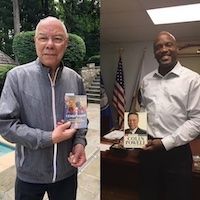| VFW Connections |
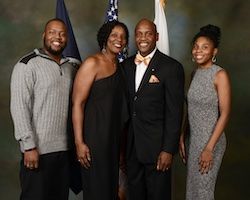 |
Victor's first experience with the VFW in his hometown of Altamonte Springs, Florida, did not go well. He had already served in the Army for a decade and was home on annual leave. After remembering the VFW post close to his neighborhood, he decided to visit. When he walked in, he said that conversation ceased and everyone stared at him hard, "like the scene on Beverly Hills Cops.” While he initially thought this reaction was because he was new to the post, he quickly realized that he was not accepted there because he is Black. He ordered a beer and the bartender said, "I’m going to give you this one, but you have to leave after that.” Despite being a soldier who was serving his country, the entrenched racism still colored how he was viewed and treated.
It wasn’t until his Army retirement and beginnings as a volunteer firefighter that he became interested in Post 1503. The firehouse received a call when a bingo player had difficulty breathing during one of the bingo nights. Victor was very impressed with the group of Veterans and the strong family vibe. He returned when the post was hosting a gun and knife show about 10 years ago. Conrado Morgan encouraged him to sign up for a Life Membership, which Victor describes as "the best decision I’ve made in a long line of best decisions.” |
Victor was born at Winter Park Memorial Hospital in Florida, as the family’s hometown of Altamonte Springs did not have its own hospital. He was the sixth (or 6.5) of seven children, as his twin sister was born just 10 minutes before Victor was welcomed into the world. His birth was a bit of a surprise, as twins were not expected for the pregnancy. He required a blood transfusion at birth but made a full recovery.
He grew up in Florida, as individuals from both sides of his family—the Angry branch and the Lomax branch—had settled there. Victor has been able to trace his family roots on the Lomax side to the days of slavery. Originally, his grandfather, David Lomax, worked under the Lomax family in South Carolina on their family farm. (Enslaved people of African descent were typically identified by the last names of their enslavers.) When the Lomax family moved to Florida, they took David with them. David was responsible for everything for the Lomax family: landscaping, farming, and building the "Big House” by Lake Mobile that would eventually become the family’s home.
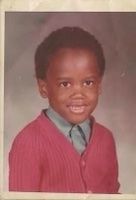
During his childhood, Victor remembers the Altamonte Springs house as being drafty and worn down, including four-foot drops in the places where the floor had eroded. Despite the structure being a bit worse for wear, this house served as the gathering place and foundation for the family. His mother and father lived in a duplex across town. That area was known as "Black Bottom,” both for the strong Black community and for the darkness that took over the town at night due to the lack of streetlights. The summer weather was hot, and Victor and the other children would often dash across the unpaved dirt roads so he wouldn’t burn their feet.
Growing up in a large family meant that Victor learned a lot from his siblings. He credits his fearless spirit and tenacity to watching some of the older ones stake their place in the world. For example, he remembers that one day his father—a die-hard Cowboys fan—was staying home from Church to watch the Superbowl. Victor’s sister, Carol, announced that she was also going to be staying home, much to the shock of the rest of the family. (Victor still doesn’t know how Carol got away with her demand.) As Victor was one of the youngest in the family, Victor got all the hand-me-downs from his older siblings, including everything from his clothes to bicycles. He also sat in the back in the family’s station wagon on the flip-up seat with the rest of the younger children.
During his early childhood years, Victor’s father, David, supported the family as a truck driver. Victor remembers being amazed by the big 18-wheeler and the fact that everyone seemed to know his father. However, David went by the nickname "Papa,” as some of the lyrics of the song "Papa Was a Rollin’ Stone” described David well. As a mama’s boy, Victor did not appreciate the women who used to flock to the window of his father’s vehicle. Neither did Victor’s mother, as remembers her leaving the home and all the children for a few days when David returned home late one night. Victor promised himself that he would never be like his father in this respect.
His father eventually left the family when Victor was 10 years old. Victor recalls the final fight where his fed-up mother ended up stabbing his drunken, laughing father in the arm. Victor’s father got in the car and drove away, leaving Victor’s mother to care for the seven children on her own. David’s absence left a void in the family, also putting them in a financial bind. Victor remembers his mother having to make decisions about paying the mortgage, buying food, or keeping the lights on. There were times the family would have to choose dark nights and whatever food they could find to stay afloat. Regardless of their financial struggles, Victor is immensely grateful that his father left when he did, as it meant he was able to grow up in a household free of abuse.
School was quite challenging for Victor, especially since he couldn’t focus and had difficulty sitting still. The clinical diagnosis of ADHD would not be defined by the American Psychiatric Association until the late ‘80s, which meant that Victor started his school years by being placed in the corner frequently until he was later placed on the "Super Team,” the name given to the unofficial Special Education program at the school. As he felt alienated by the other students, he didn’t like participating in sports, extracurricular activities, or school pep rallies. This feeling of separation was even more pronounced in high school, as the students in the mid ‘80s formed strong cliques that excluded him. His closest friend was his first cousin, Terry, who was his father’s sister’s son.
After graduating from Lyman High School in 1986, Victor took a "gap year” to work. His uncle, Clifford, showed him how to do drywall. He also taught Victor the difference between a "legal hustle” (like putting up drywall) and a "street hustle” (like selling marijuana). Clifford’s girlfriend, Miss Brenda, also made sure Victor stayed on the straight and narrow. Victor affectionately refers to her as his "first drill sergeant,” making sure he didn’t spend all his money on clothes, his Jheri curl hairstyle, or partying. She is the reason Victor served his country.
One day after Victor returned from smoking with friends, Miss Brenda started to engage in her usual lecturing with a barrage of statements like "you can do better in life.” However, this time she added, "I see more in you than you see in yourself.” This thought gave Victor pause, as it was one of the first times anyone had ever expressed a sentiment like this to him. She asked him what he wanted to do with his life. Victor responded that he wanted to get out of Altamonte and see the world, thinking that perhaps college would help him do this. However, Miss Brenda knew that Victor would probably just end up partying his way through college and suggested that the military might be a better option for him.
Military History
As his older brother, Reginald, was in the Air Force, Victor decided he would visit a recruiter to see if he could also join. However, when he was met with an "out to lunch” sign on the recruiter’s door, he turned away to leave. An Army recruiter saw Victor pass by the door and quickly started a conversation. He promised Victor that he could someday outrank his brother. This "steadfast” recruiter eventually convinced Victor that he should sign up for the Army instead.
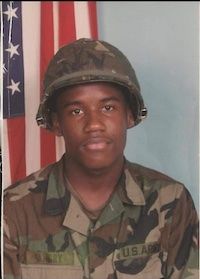
After scoring well on his ASVAB, Victor was told he could have almost any job in the Army that interested him. However, when he went to the Military Entrance Processing Station (MEPS), a discovery about his vision changed everything: when he could not see the numbers within the Ishihara color test circles, he was diagnosed with color blindness. This limited the military jobs he could qualify to take. Ironically, the MOS Victor ended up accepting was 93P, a flight aviation coordinator. This group controls the airspace for the helipads to support helicopter training and operations.
Victor officially enlisted in December of 1987. He completed basic training in Fort McClellan, Alabama, before heading just a few hours away to Fort Rucker for Advanced Individual Training (AIT). In March of 1988, Victor traveled to Darmstadt Army Base in Germany for his first duty station.
Shortly after arrival, he received a phone call from his cousin with the devastating news that Terry’s little sister, Stephanie, had died from injuries from hitting her head after a car accident. His Commander, MAJ Emil F. Meiz III, was immensely kind, ensuring that an E-5 would help Victor get a flight home immediately. After a month at home, his commander called to be sure that Victor wouldn’t go Absent Without Leave (AWOL). He reminded Victor to remember what he wanted to do with his life, also supporting Victor with mentorship after he returned to Germany. It was Victor’s first experience with strong, admirable leadership that would provide him with inspiration for the type of leader he wanted to become someday.
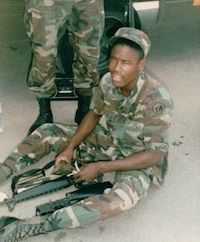
It was also in Germany that Victor met his wife, Michelle, as she walked to the shopette on post. She was a military police officer who had also completed her basic training at Fort McClellan. They dated for much of Victor’s two-year tour before they married in April of 1990 in Denmark.
From there, Victor received orders to Fort Belvoir for the Centralized Army Aviation Support Office (CAASO). Although it took Michelle some time, she also found an assignment at Belvoir, and the two were able to continue their enlistments together. Their son was born at DeWitt Hospital. It was also here that Victor, then an E-5, met 1SG John Tilley, the man he credits with helping him to mature into leadership. For example, Victor had a red Nissan Sentra with giant speakers and the word "NASTY” splashed across the back window for a group called the "Nasty Nissan Club.” After the Colonel complained about the car and noise, 1SG Tilley told Victor that he had strong leadership potential in him, but he couldn’t just turn off the leadership at the end of the workday; if he didn’t make good choices in his life, then life would make the choices for him. It made Victor realize that he had to be prepared for the opportunities that life would present to him, so he scraped the letters off the car and focused on his behavior.
Orders came down for Korea for a one-year unaccompanied tour. Victor was assigned to the 4th Battalion, 501st Aviation "Gunfighter Ops” at Camp Page, close to the DMZ. The location was austere, and all the soldiers shared a single bicycle. It was there that Victor received training with the Cobra helicopters (AH-1). During night missions with the live fire missiles, Victor saw people in the mountains. He later learned that some Korean people engaged in the dangerous collection of the copper to sell in the city. Once his time in Korea was over, Victor headed to Ft. Rucker for additional training before going to Davison Army Airfield in Virginia.
After a new reenlistment, Victor was asked to make the transition from leading the active Army to the National Guard in what he describes as a "perfect moment.” The Secretary of the Army wrote a letter stating that Victor was being transferred, much to the surprise of the rest of the command. He received these new orders, heading to Mather Field in California for a six-month aviation assignment. From there, the family went to Scott Air Force Base in Illinois for the Joint-Operational Support Airlift Center (JOSAC) where he remained for a few years.
Now a First Sergeant, Victor and his wife headed to Hawaii for his next duty station. His daughter was also born during this time. In Hawaii, Victor felt like all the parts of his life were finally aligned when he received the news that his mother had passed away after suffering a major heart attack, which had hospitalized her for two weeks. He said it felt like "when he had his puzzle of life just about finished, it all fell apart.” He credits his company and his wife for keeping things going for the next few months while he tried to get through the incredible grief from this loss, find all the pieces of his life’s puzzle, and begin putting it all back together again. There were many moments when life felt fuzzy, like when he returned to Hawaii to complete a 10K road race. He didn’t recall much about the race except running along the beach and crossing the finish line. When he looked up, he realized he was breaking the ribbon for a first-place finish. He had been lost in thought about his mother the entire race, not realizing he was about to win. He also deeply contemplated one of her last wishes for him, which was to patch up his relationship with his father. Later, Victor’s family received word that his father was in very poor health, his mother implored him to reconcile with him before it was too late. Although it had been almost forty years since he saw his father, Victor slowly rekindled trust in his father over the next five years, especially as David was contrite for his poor decisions while Victor was growing up.
It was then time for Victor to complete the Sergeants Major Academy at Fort Bliss, Texas. He was part of USASMA Class 55, known as the "Double Nickel.” Additionally, although Victor didn’t play sports in school, his love of fitness had blossomed, especially during this time in his military career. He played volleyball and enjoyed cross-country running, later even competing in marathon running.
From there, Victor become the Equal Opportunity (EO) Sergeant Major for the entire Army National Guard in Crystal City. He then spent some time back at Davison. Returning to Belvoir, he simultaneously served as the Command Sergeant Major for the Operational Support Airlift Agency (OSACOM) and the Sergeant Major for the Operational Support Airlift Agency (OSSA) at Davison Army Airfield.
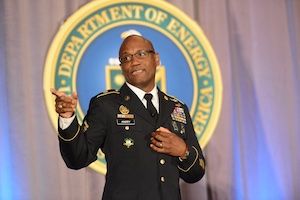
One day, Victor received a call from Major General Raymond Carpenter, the director of the Army National Guard. He wanted Victor to take over as the Command Sergeant Major of the Army National Guard. He felt Victor’s positivity and professionalism were the right traits for the role. Victor would be the first African American to hold this position. He traveled through the United States and U.S. territories. Although it took a few months before the senior officials really trusted him, Victor maintained his role as a professional and demonstrated his leadership. It was also very important to Victor that his team members felt comfortable in providing different perspectives or disagreeing with him. His last assignment was in the Inspector General’s office for six months. On April 1, 2011, it was time for Victor to retire.
Victor’s retirement ceremony was standing room only. Many from his military career came out to celebrate him on this day, including Major General Ray Carpenter, who appointed him as the Interim Command Sergeant Major of the Army National Guard, and General Craig McKinnley, who was the National Guard’s first four-star General. As he looked out to the crowd, he saw the full circle of his family journey. There was an empty seat to honor his mother, and Miss Brenda sat right next to it, followed by his father. Although Victor’s siblings were in attendance, many other members of the Lomax family couldn’t be there for the event. However, several individuals from the Angry family were there to support him and cheer him on. Victor is deeply proud of his military legacy of 23 years of service, retiring as a Command Sergeant Major, and being awarded two Legions of Merit.
After his retirement, Victor spent some time in the Protocol Office before meeting with Navy Federal. They were looking for a Sergeant Major to help support the financial institution as it branched out to all members of the Armed Forces. He did this for five years, again traveling around the country as part of his role.
Eventually, he decided it was time to return to Prince William County and support the community. He also started working at the Chinn Center as a fitness attendant with the goal of eventually becoming a personal trainer. Additionally, Victor has served as a volunteer firefighter and public education coordinator since 2011.
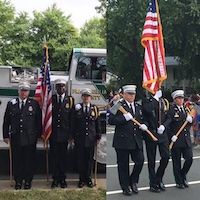
In 2018, he published a book entitled Angry Leadership: My Seven Guiding Principles of Leadership. The text cites seven "disciplines of leadership” that marked major milestones in his life: Foundation, Reinforced Words, Mentors, Fitness, Tenacity, Preparation, Self-evaluation, and The Crossroad.
In February of 2019, Neabsco District Supervisor John D. Jenkins passed away, and Victor received a call asking if he would run for the position, winning the election. Victor Angry currently serves as the Prince William County Neabsco Supervisor. As with his military legacy, Victor feels that his purpose in life is to serve and to lead when called to do so, even when it means that not everyone will agree with him. Therefore, despite some of the challenging and controversial topics that have faced the Board of County Supervisors, he is happy to represent those constituents of his district while still upholding the needs of the county as a whole.
As a long-term personal goal, he hopes to be a personal trainer at 80, inspired by a trainer named Lawrence at the Chinn Center who also held this role at that age. Victor also loves the water and hopes to take more fishing trips, like a recent visit to Louisiana with his brothers. Additionally, Victor and Michelle hope to take a "trip down memory lane” to visit some of the many places from their travels during their time in the military.
- During Victor’s childhood, the Lake Mobile area wasn’t considered to be desirable for housing, as it frequently flooded due to a lack of proper drainage and was filled with swarms of mosquitoes. However, the lakefront property is now considered to be prime real estate, especially as the drainage improved, the roads were paved, and the homes have been remodeled.
- As a child, Victor climbed the orange trees to help stave off his hunger when there wasn’t enough food to go around. Because of this, Victor experienced skin discoloration due to phytophotodermatitis (caused exposed to the sun with the orange juice on his skin) and tinea versicolor (also impacted by sun exposure and citric acid).
- Because Victor was born 10 minutes after his twin sister, Victoria, he jokes that his sister’s birthday is from 12:00-12:10 AM and his birthday takes up the rest of the day.
- When he was younger, Victor went by a variation of his middle name as a nickname. His middle name was Sean, but everyone called him "Seen” pronounced as "scene.”
- Although Victor didn’t want to be like his father in every way, he did consider becoming a truck driver when he was older. Despite not taking on truck driving as a profession, he would later drive the fire trucks as one of his roles while being a volunteer firefighter.
- Victor won first place a coloring contest when he was in elementary school. He created a rainbow elephant that was praised by his teacher. However, this was long before Victor knew that he was color blind, so to him it looked pretty similar to the grey elephants he saw in pictures. He was an adult before he found that that elephants are grey.
- One of the reasons that Victor loves his wacky bow ties and funny socks is that he doesn’t need to worry about matching the colors to his clothes.
- While Victor felt his decision to leave home and move in with his Uncle Clifford and Miss Brenda was his choice to be independent, he later learned that they had coordinated everything with his mother ahead of time.
- The day Victor went to see the Air Force recruiter, his cousin also came with him. However, Terry wouldn’t get out of the car when they arrived, leaving Victor to head to the office without him.
- Boot camp went fairly smoothly at Fort McClellan. However, there was one day during M-16 training when Victor spotted a rattlesnake right in front of him. Although his drill sergeant was not impressed when Victor jumped into the air, he is still thankful that he reacted quickly to get away from the snake.
- While Victor’s color blindness didn’t impact most of his day-to-day operations, there were some issues with the blue-green-red color system for scheduling flights at Davidson Army Airfield. After a few mix-ups, they changed to a pattern system instead.
- It did come to pass that the Army recruiter was right: Victor became a Command Sergeant Major, eventually outranking his brother. The Belvoir Eagle once ran a story on Victor and his brother, noting the potential sibling rivalry between the brothers in their respective branches.
- Victor almost didn’t have the chance to reconnect with his father before his death. David’s second wife had abandoned him at a hospital, leaving Victor’s father alone. However, David repeatedly called out his eldest daughter’s name, Regina. The nurse searched Facebook and found Regina. At first, the family was concerned it was some sort of scam and didn’t respond. However, the nurse continued to reach out until Regina finally called the nurse and learned about her father’s situation.
- As a fitness attendant at the Chinn Center, Victor had a patron tell him that he wasn’t feeling well. After Victor helped the man to sit down, he complained of dizziness, collapsing into Victor’s arms, and completely losing a pulse. Victor was able to start CPR with another attendant and get the center’s AED machine, which ultimately revived the man.
- Today, Victor says he has gone from being on the "Super Team” to the Supervisor, reflecting on his transformation from struggling in school to serving as a community leader.
